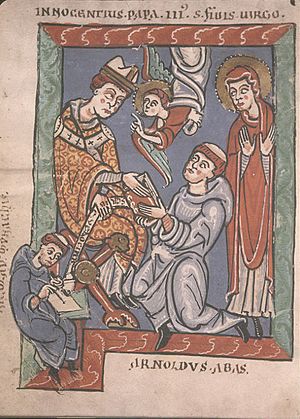Arnaud Amalric facts for kids
Arnaud Amalric (died 1225) was an important Cistercian abbot. An abbot is the head of a monastery. He played a big part in the Albigensian Crusade, a religious war. During this time, he was a leader of the crusader army. He is known for a famous, but likely untrue, quote about a battle.
Contents
Early Life and Religious Role
Arnaud Amalric started his religious career as an abbot in different monasteries. From 1196 to 1198, he was the abbot of Poblet in Catalonia, a region in Spain. After that, he led the Grandselve monastery from 1198 to 1202. Then, he became the seventeenth abbot of Cîteaux, a very important Cistercian monastery, and stayed there until 1212.
The Albigensian Crusade
In 1204, Pope Innocent III chose Arnaud Amalric to be a papal legate. This meant he was the Pope's special representative. He was sent to try and convert a group of people called the Albigensians, who had different religious beliefs. When this effort failed, Amalric became very active in encouraging people to join a crusade against them. A crusade was a religious war.
He led the crusader army that attacked the city of Béziers in 1209. During this attack, many people died. It's often said that when asked how to tell the difference between the Albigensians and Catholics, Amalric replied, "Kill them all and let God sort them out."
However, this famous quote is probably not true. A writer named Caesarius wrote that Amalric was reported to have said it, meaning it was hearsay. Most historians today believe he didn't actually say these words. The quote is often used to show how brutal the northern crusaders were.
Arnaud Amalric himself wrote a letter to the Pope in August 1209. In this letter, he claimed 20,000 people died in Béziers. But this number was likely much higher than the real one. Historians believe the city's population was much smaller, and many people might have escaped. The attack happened very quickly, so it's possible Amalric didn't even know exactly what was happening until it was over. The city of Béziers also continued to be an important place afterward, suggesting it wasn't completely destroyed.
After the crusaders captured another city called Carcassonne, Amalric was replaced as the army's main commander by Simon de Montfort, 5th Earl of Leicester. But Amalric still traveled with the army and had a lot of power.
The Siege of Minerve
Another important event was the Siege of Minerve on July 22. The people defending the town agreed to surrender. Simon de Montfort wanted to be fair to them. But Amalric, as the Pope's representative, said no agreement was valid without his approval.
They worked out a plan. Soldiers and Catholics in the town could leave safely. Albigensians who were not yet "perfect" (a high rank in their religion) could also leave. However, the Albigensian "perfects" were given a choice: either change their beliefs and become Catholic, or face a severe punishment. Many soldiers wanted to attack everyone, but Amalric calmed them. He predicted that most of the "perfects" would not change their minds. He was right. Only three women changed their beliefs. The other 140 were burned at the stake.
Later Life
Around 1212, Arnaud Amalric became the archbishop of Narbonne. This happened after he went on a trip to Spain to encourage Christians fighting against the Moors. He even wrote about this trip.
Amalric was known for his strong opinions, which sometimes caused problems with leaders like Simon de Montfort. In 1224, he led a meeting in Montpellier to discuss complaints from the Albigensians.
Not much is known about Amalric's life after 1222. He died on September 29, 1225, in Fontfroide, France.
See also
 In Spanish: Arnaldo Amalric para niños
In Spanish: Arnaldo Amalric para niños
 | John T. Biggers |
 | Thomas Blackshear |
 | Mark Bradford |
 | Beverly Buchanan |


